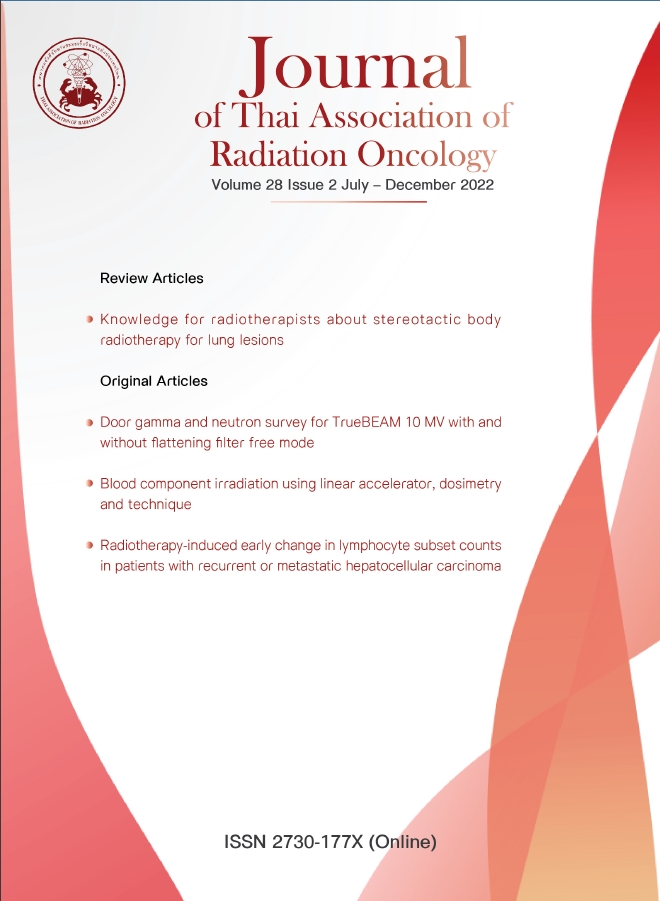Radiotherapy-induced early change in lymphocyte subset counts in patients with recurrent or metastatic hepatocellular carcinoma.
Keywords:
cancer immunotherapy, radiotherapy, lymphopenia, immunomodulatory effectAbstract
Background: In addition to the direct effects of radiation therapy on cancer, the subsequent immune response activates the immune system.
Objective: The purpose of this study was to investigate early changes in a subset of peripheral blood lymphocytes in patients with recurrent or metastatic hepatocellular carcinoma (HCC) after radiation therapy.
Materials and methods: Lymphocyte subset analysis of seven consecutive patients with recurrent or metastatic HCC was performed at two time points: immediately before and two weeks after the start of radiation therapy.
Results: Absolute lymphocyte counts decreased two weeks after the start of radiation therapy, but the percentage of CD4+ lymphocytes increased from 30.5 +/- 5.4% before radiation therapy to 42.0 +/- 5.3% two weeks after the start of radiation therapy (p<0.01). The CD4+/CD8+ ratio increased significantly from 0.88 +/- 0.32 before radiation therapy to 1.45 +/- 0.62 two weeks after the start of radiation therapy (p=0.02).
Conclusion: This is the first report of recurrent or metastatic HCC that radiation therapy induces CD4+ T lymphocytes and increases the CD4+/CD8+ ratio in two weeks. Understanding the lymphocyte subset changes two weeks after the start of radiation therapy may help in developing treatment strategies for recurrent or metastatic HCC.
References
Chen C, Liu Y, Cui B. Effect of radiotherapy on T cell and PD-1 / PD-L1 blocking therapy in tumor microenvironment. Hum VaccinImmunother. 2021; 17:1555-1567.
Llovet JM, De Baere T, Kulik L, Haber PK, Greten TF, Meyer T, et al. Locoregional therapies in the era of molecular and immune treatments for hepatocellular carcinoma. Nat Rev Gastroenterol Hepatol. 2021; 18:293-313.
Chen LC, Lin HY, Hung SK, Chiou WY, Lee MS. Role of modern radiotherapy in managing patients with hepatocellular carcinoma. World J Gastroenterol. 2021; 27:2434-2457.
Llovet JM, Castet F, Heikenwalder M, Maini MK, Mazzaferro V, Pinato DJ, et al. Immunotherapies for hepatocellular carcinoma. Nat Rev Clin Oncol. 2022; 19:151-172.
Saung MT, Pelosof L, Casak S, Donoghue M, Lemery S, Yuan M, et al. FDA approval summary: Nivolumab plus ipilimumab for the treatment of patients with hepatocellular carcinoma previously treated with sorafenib. Oncologist. 2021; 26:797-806.
Sangro B, Sarobe P, Hervás-Stubbs S, Melero I. Advances in immunotherapy for hepatocellular carcinoma. Nat Rev Gastroenterol Hepatol. 2021; 18:525-543.
Donlon NE, Power R, Hayes C, Reynolds JV, Lysaght J. Radiotherapy, immunotherapy, and the tumour microenvironment: Turning an immunosuppressive milieu into a therapeutic opportunity. Cancer Lett 2021;502:84-96.
Ashrafizadeh M, Farhood B, Musa AE, Taeb S, Najafi M. The interactions and communications in tumor resistance to radiotherapy: Therapy perspectives. Int Immunopharmacol. 2020; 87:106807.
Ghavimi S, Apfel T, Azimi H, Persaud A, Pyrsopoulos NT. Management and treatment of hepatocellular carcinoma with immunotherapy: A review of current and future options. J Clin Transl Hepatol. 2020; 8:168-176.
Finn RS, Qin S, Ikeda M, Galle PR, Ducreux M, Kim TY, et al. Atezolizumab plus bevacizumab in unresectable hepatocellular carcinoma. N Engl J Med. 2020; 382:1894-1905.
Pinter M, Scheiner B, Peck-Radosavljevic M. Immunotherapy for advanced hepatocellular carcinoma: a focus on special subgroups. Gut. 2021; 70:204-214.
Ménétrier-Caux C, Ray-Coquard I, Blay JY, Caux C. Lymphopenia in cancer patients and its effects on response to immunotherapy: an opportunity for combination with Cytokines? J Immunother Cancer 2019;7:85.
Barsoumian HB, Ramapriyan R, Younes AI, Caetano MS, Menon H, Comeaux NI, et al. Low-dose radiation treatment enhances systemic antitumor immune responses by overcoming the inhibitory stroma. J Immunother Cancer. 2020; 8: e000537. Published online 2020 Oct 26.
Herrera FG, Ronet C, de Olza MO, Barras D, Crespo I, Andreatta M, et al. Low-dose radiotherapy reverses tumor immune desertification and resistance to immunotherapy. Cancer Discov. 2022; 12:108-133.
Cho O, Noh OK, Oh YT, Chang SJ, Ryu HS, Lee EJ, et al. Hematological parameters during concurrent chemoradiotherapy as potential prognosticators in patients with stage iib cervical cancer. Tumour Biol. 2017; 39:1010428317694306–1010428317694306.
Wang Q, Li S, Qiao S, Zheng Z, Duan X, Zhu X. Changes in T lymphocyte subsets in different tumors before and after radiotherapy: A meta-analysis. Front Immunol. 2021; 12:648652.
Downloads
Published
How to Cite
Issue
Section
License
Copyright (c) 2022 Thai Association of Radiation Oncology

This work is licensed under a Creative Commons Attribution-NonCommercial-NoDerivatives 4.0 International License.
บทความที่ได้รับการตีพิมพ์เป็นลิขสิทธิ์ของวารสารมะเร็งวิวัฒน์ ข้อความที่ปรากฏในบทความแต่ละเรื่องในวารสารวิชาการเล่มนี้เป็นความคิดเห็นส่วนตัวของผู้เขียนแต่ละท่านไม่เกี่ยวข้องกับ และบุคคลากรท่านอื่น ๆ ใน สมาคมฯ แต่อย่างใด ความรับผิดชอบองค์ประกอบทั้งหมดของบทความแต่ละเรื่องเป็นของผู้เขียนแต่ละท่าน หากมีความผิดพลาดใดๆ ผู้เขียนแต่ละท่านจะรับผิดชอบบทความของตนเองแต่ผู้เดียว




